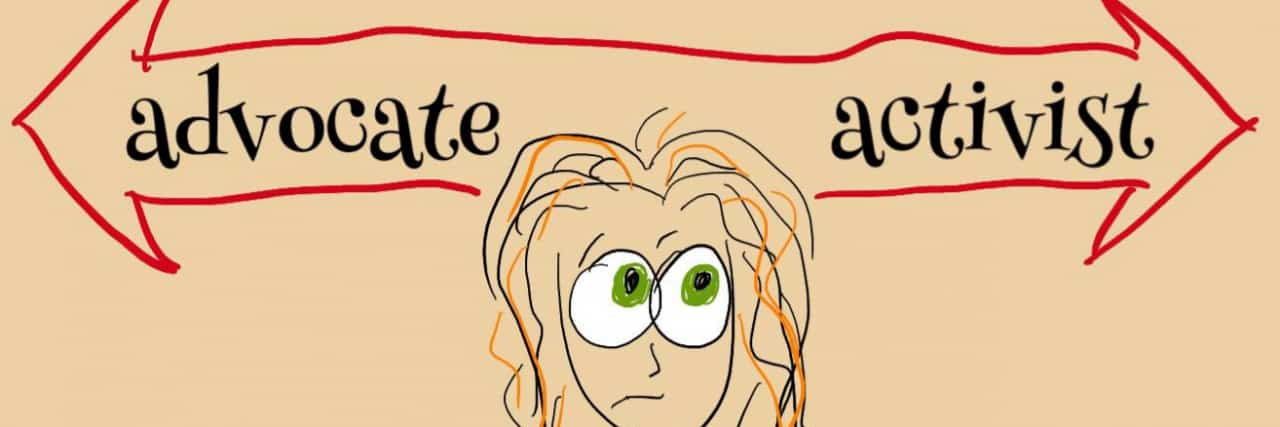Advocate or Activist? Finding Your Comfort Zone on the Health Advocate-Activist Continuum
A close friend of mine has been making a lot of Instagram reels lately, all on the point of raising awareness for medically complex children and their parents, and for inspiring positive change in the medical community. I fondly realized she’s become an activist.
Which made me think…. What am I?
Can I call myself an activist?
Should I be making reels?
For a living, I speak about invisible disabilities, to raise awareness, and to help people (and to keep paying the bills despite my own disability). I also do things not necessarily for income, like writing this article. But am I shouting my message from a mountaintop?
Should I be doing anything at all more?
My answer at this point in my life is that no, I don’t need to do more. I certainly am doing a good deal, and I must do my deal within the restrictions of my disability and considerations for self-care and a measure of mindless leisure.
So with peace that I’m doing enough, I return my contemplation to identity, whether I can or do identify as an activist.
According to Merriam-Webster, an activist is:
a person who uses or supports strong actions (such as public protests) in support of or opposition to one side of a controversial issue
“Strong actions” is not entirely clear, but I can say I don’t show up to public protests. I don’t even make “strong” statements on social media. I’m not one for inciting debates or for ruffling anybody’s feathers; it’s just not my style. So perhaps I’m not an activist.
Now let’s go back to Merriam-Webster and look at advocate:
one who defends or maintains a cause or proposal; one who supports or promotes the interests of a cause or group
Well, that I certainly identify with!
What I’ve learned, however, in my work as an … advocate … is that there is no black or white, right or wrong. As there is no requirement to be an extreme version of an identity or a diagnosis, a most severe case, a textbook box-checker, to claim a diagnosis and/or to identify as disabled, there likewise is no mandate that one must hold up a sign on the Capitol steps in order to bolster a belief. We live with finite terms to express identity with infinite visages of expression.
So if you, like I, wonder if you’re an advocate or an activist, perhaps you can instead agree with me that we are not either/or, but that we simply are. We act within a continuum of advocate-activist and participate in a way that is comfortable, meaningful, fulfilling, and impactful for each of us. What matters much more than what we are called is what we are doing, and yes, every little bit helps.
For those who may not have the opportunity, means, or comfort level to act on the “strong” end of the advocate-activist continuum, here are some things you can do:
- Educate yourself so that you can be a resource for people with questions or during casual conversations.
- Share your personal story to what extent is comfortable for you.
- Join an online group and encourage others who care about the same thing.
- Learn what actions/words/thoughts are harmful and stop yourself.
- Lead a college club or employee resource group.
- Create a virtual or in-person safe space for people to meet and share.
- Volunteer within an impacted community or related charity.
- Donate money within your means or appropriate/requested items to an impacted community or individual or to a related charity.
- Check in on your family and friends.
- Show a symbol of support and awareness, such as bumper sticker or a flag.
- Speak up (or write up) when you notice someone or yourself being wronged.
- Expand your own comfort zone by trying new things, initiating conversations with strangers, etc., and transfer that new boldness to expressions for your cause.
Remember, so much more of the world and your own powers open up when you abandon the focus on “doing it right,” and you just do what you can.
——
Christina Irene is a professional speaker who has presented on invisible disabilities to educational institutions, not-for-profit organizations, government entities, community groups, and corporations around the world. Inspired by her own chronic conditions, she created the Splat system for talking about and managing disability and published two books on it — “TalkingSplat: Communicating About Our Hidden Disabilities” and “Splatvocate: Supporting People With Hidden Disabilities.” Besides writing nonfiction, fiction, and poetry, her passion is adventure; she’s traveled to all 50 states, dozens of national parks, and 20 countries. She lives in central Pennsylvania where she serves elected and appointed roles on local community boards. Check out her resources and tools at www.TalkingSplat.com.

